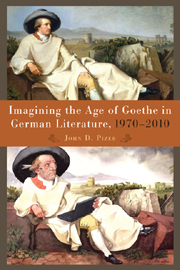Book contents
- Frontmatter
- Contents
- Acknowledgments
- Introduction
- 1 Staging Violence and Transcendence, Embracing Feminism: The Instantiation of Kleist and German Romanticism
- 2 Hölderlins East and West
- 3 Between Feminism and National Identity: The Historical Novels of Renate Feyl
- 4 Goethe Contra and Pro
- 5 Savaging and Salvaging the German Enlightenment
- Conclusion
- Bibliography
- Index
5 - Savaging and Salvaging the German Enlightenment
Published online by Cambridge University Press: 05 February 2013
- Frontmatter
- Contents
- Acknowledgments
- Introduction
- 1 Staging Violence and Transcendence, Embracing Feminism: The Instantiation of Kleist and German Romanticism
- 2 Hölderlins East and West
- 3 Between Feminism and National Identity: The Historical Novels of Renate Feyl
- 4 Goethe Contra and Pro
- 5 Savaging and Salvaging the German Enlightenment
- Conclusion
- Bibliography
- Index
Summary
The European Enlightenment placed great faith in human reason and scientific progress. Its adherents believed that rational thought and progressive education could help curb humanity's dark impulses, create greater social harmony, and promote equality and peace among nations. Already during the German Storm-and-Stress and Romantic periods, this focus on reason at the expense of faith and emotion provoked resistance. However, it was the employment, particularly in more recent times, of scientific progress for human exploitation, the use of technology for evermore-destructive wars, and the massive despoiling of nature in the pursuit of its resources that helped inspire German authors from the 1970s to the present to call the Enlightenment's ideals and priorities into question through fictional caricatures of its leading adherents. The following chapter examines in detail three novels that pursue such caricature: Daniel Kehlmann's Die Vermessung der Welt (Measuring the world, 2005), Klaas Huizing's Das Ding an sich (The thing-in-itself, 1998), and Gert Hofmann's Die kleine Stechardin (The little flower girl, 1994).
We will begin, however, by briefly examining Heiner Müller's play Leben Gundlings Friedrich von Preußen Lessings Schlaf Traum Schrei: Ein Greuelmärchen (Gundling's life Friedrich of Prussia Lessing's sleep dream scream: A horror story, 1976). With respect to postmodern Enlightenment critiques that caricature well-known intellectuals from the Age of Goethe, Müller's play is the pioneering work in German-language imaginative literature, and provides a logical starting point. Following this, an examination of the philosopher Hans Blumenberg's Der Prozeß der theoretischen Neugierde (The process of theoretical curiosity, 1973) will offer a crucial context for our analysis.
- Type
- Chapter
- Information
- Imagining the Age of Goethe in German Literature, 1970–2010 , pp. 156 - 186Publisher: Boydell & BrewerPrint publication year: 2011

